Experienced gardeners successfully use ordinary table salt as a top dressing for some vegetables. The distribution of this substance contributes to its environmental friendliness and profitability. Especially useful is such an unusual fertilizer for tomatoes. When used correctly, saline irrigation makes the tomatoes sweeter and protects plants from diseases and pests.
Content
The benefits of table salt for plants
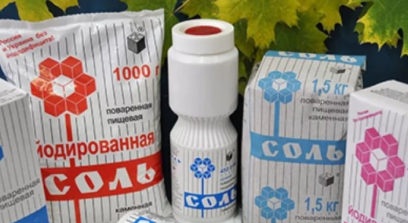 Common table salt is also known by other names. It is also called stone, food or dining room. The bulk of this product is sodium chloride or NaCl. This substance is white in color, resembling sand. Most often, salt is used in cooking to improve the taste of dishes, as well as an environmentally friendly preservative, which makes the shelf life of products longer. In the chemical industry, table salt is used to produce hydrochloric acid and baking soda.
Common table salt is also known by other names. It is also called stone, food or dining room. The bulk of this product is sodium chloride or NaCl. This substance is white in color, resembling sand. Most often, salt is used in cooking to improve the taste of dishes, as well as an environmentally friendly preservative, which makes the shelf life of products longer. In the chemical industry, table salt is used to produce hydrochloric acid and baking soda.
In relation to plants, rock salt has the following positive effect:
- protects from harmful insects;
- reduces the time of setting and ripening of fruits;
- as a top dressing for vegetables improves the taste of the fruit.
Application methods for growing tomato
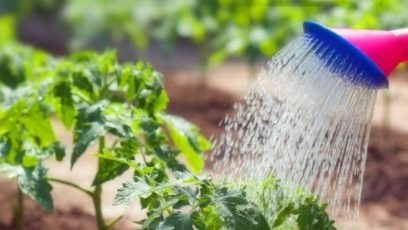 Fertilizers based on sodium chloride are prepared according to various recipes. Processing plants is performed early in the morning or in the evening when there is no active sun. Then the foliage of tomato bushes will be protected from burns. To improve the “stickiness” of the product, a small amount of liquid soap is introduced into it. Such treatments are useful for controlling late blight.
Fertilizers based on sodium chloride are prepared according to various recipes. Processing plants is performed early in the morning or in the evening when there is no active sun. Then the foliage of tomato bushes will be protected from burns. To improve the “stickiness” of the product, a small amount of liquid soap is introduced into it. Such treatments are useful for controlling late blight.
Salt solution, due to its specific taste, repels harmful insects. This property is used to protect plants from their attack. After irrigation with such a tool, the finest deposit of salt dust remains on the foliage, which does not allow the development of fungal spores. It is more convenient to process the bushes by spraying with a spray gun. Before use, it is recommended to pass the prepared solution through a filter to get rid of insoluble particles.
Before the treatment of late blight infected bushes, all damaged parts of the plant are cut off from them. The foliage is treated on the upper and lower sides. To improve the taste of tomatoes, during the ripening of the crop, 500 ml of the prepared preparation is poured under each bush. Such top dressing is carried out only for adult plants, with 6 or more formed leaves once every 3-4 weeks.
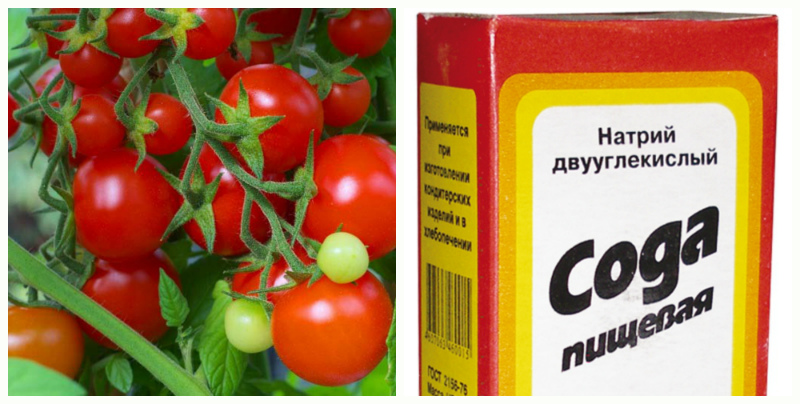 You may be interested in:
You may be interested in:Salt Recipes
 Different means are prepared from salt and water, depending on the purpose. Additional components are sometimes administered.
Different means are prepared from salt and water, depending on the purpose. Additional components are sometimes administered.
As a top dressing during the formation and ripening of fruits, a solution is prepared consisting of water heated to +25 degrees in the amount of 10 l, 200 ml of wood ash and 1 tbsp. l rock salt. After thorough mixing, the prepared product is used to water the plants every week.
To make the tomatoes more sweet and tasty, they are watered every 10 days with a solution consisting of 10 liters of warm water and 1 tbsp. l table salt.
To prevent infection or cure already begun late blight of plants, use a concentrated solution. To prepare it, add 1 cup of sodium chloride to 10 liters of water. Such spraying is carried out 1 time in 30 days.
To improve the effect of the spray solution, a little liquid soap is introduced into it. Instead of a liquid product, you can add chips from laundry soap and dissolve it in a liquid.
 You may be interested in:
You may be interested in:Advantages and disadvantages
The positive effect of salt solutions for tomatoes is as follows:
- the taste of ripened tomatoes improves, they become more sugary;
- plants are protected from fungal diseases;
- pests do not damage the bushes.
With improper use of top dressing, the following negative consequences are possible:
- soil acidity increases, favorable conditions arise for the development of root eater;
- disturbed balance of nutrients in the soil and in the plant itself.
Saline solutions as fertilizer on beds with tomatoes will fully show their effectiveness only if used correctly. The concentration of the active substance should be low. Processing should be carried out no more than 1 time in 7 days. It is impossible to apply such top dressing without emergency.

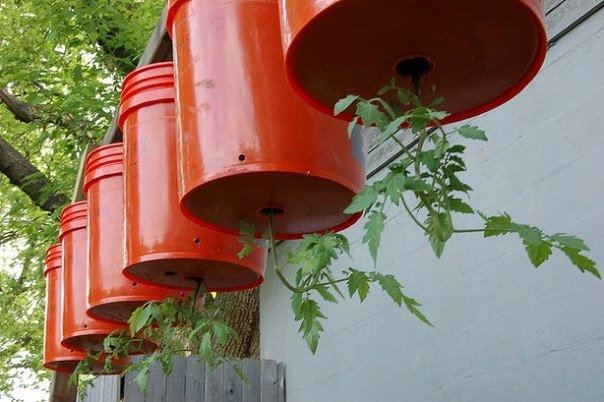
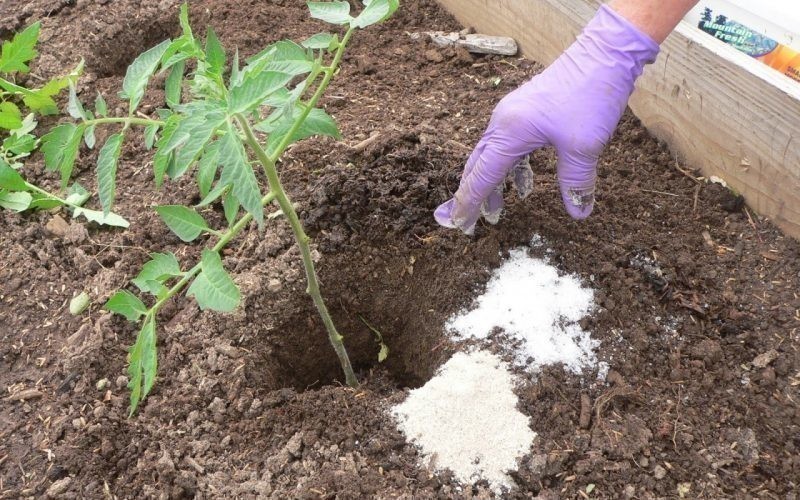
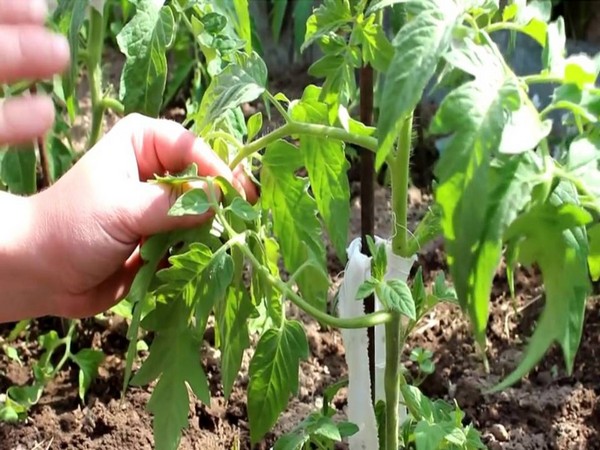
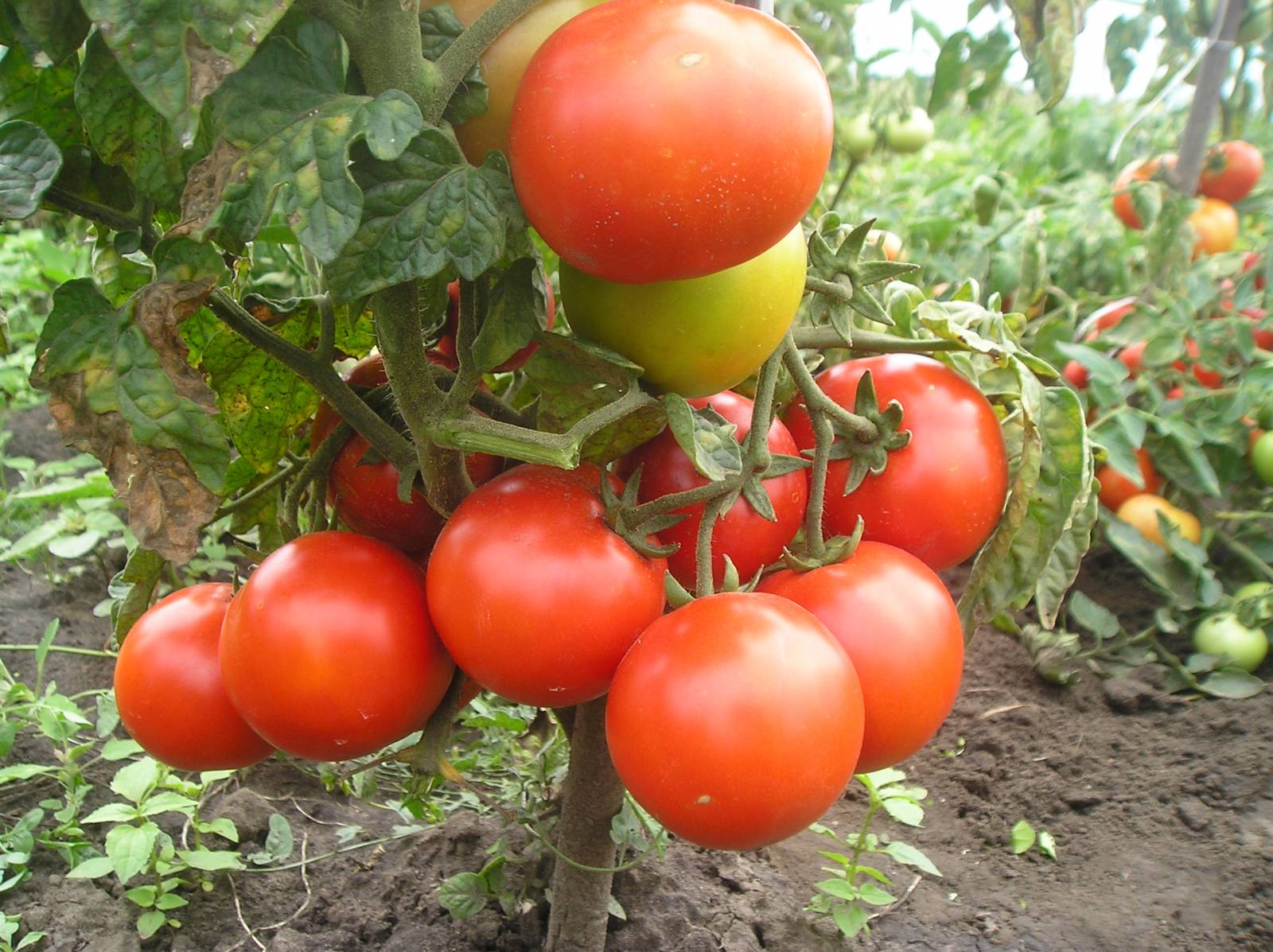 Low-growing tomatoes, without pinching: 5 of the most delicious varieties
Low-growing tomatoes, without pinching: 5 of the most delicious varieties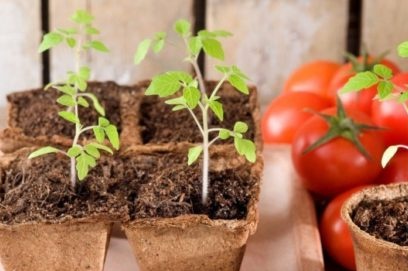 Why tomato seedlings grow poorly
Why tomato seedlings grow poorly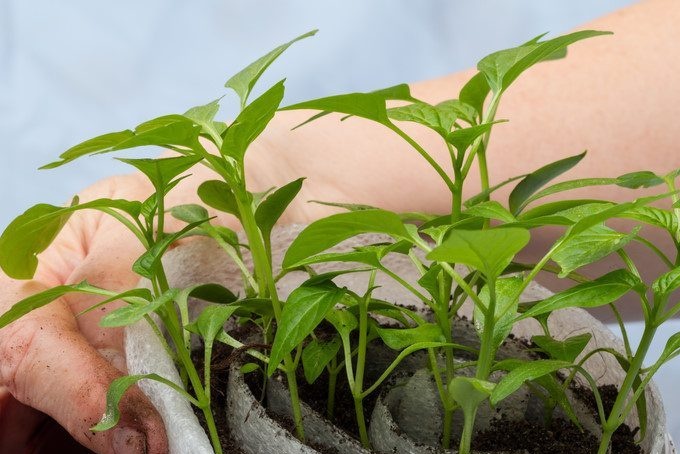 We grow a tomato in a shell
We grow a tomato in a shell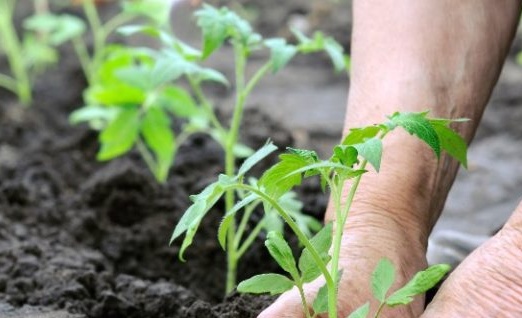 Growing tomatoes without watering according to the method of Kazarin
Growing tomatoes without watering according to the method of Kazarin
Natalya
For about 40 years I have been growing tomato seedlings for my garden and have never poured salt water on it! Not everything that is written on the Internet must be applied! In 2016, I read on the Internet that cucumbers should be sprayed with water with iodine, but in order to not burn iodine, add milk or whey to the solution! I did this treatment, but the next day I did not recognize my raging cucumbers! A black small midge flew over the smell of milk and in a week's time sucked all the tops and leaves! Twice processed from sucking insects, but alas ... left without cucumbers!
Vladimir
I don’t know the cucumbers, I haven’t heard that they’re scouring them with iodine.
.A tomatoes always sprinkle with such a solution. Prevention of late blight and tomatoes will be sweeter. Salt, I think, is nonsense. As a result, the soil will turn into solonchak. I don't think so. We definitely won’t do that.
Vladimir
A solution of iodine with milk and water is an effective tool for processing tomatoes. need to know the dose. We have been spraying tomatoes with this solution for many years in the country and there are no problems. if someone blackens rot we hang until late autumn
Svetlana
Salt and soda are very harmful to the soil. Information from the Procvetok channel. And the taste depends on the variety.
Victor
I don’t know, but salt is harmful to the soil, then all the plants will be frail, I just think from experience I used to fill the fields with water, someone came up with irrigation of the grass, at first everything grew, then the crop grew worse every year, the fields became saline worse though the water was from the river it’s better to rain the water is soft so think yourself
Khalil
Salt is Poison for the plant world.
Basil
Salt cannot be top dressing, because it does not contain plant nutrients.
The whole effect of the fact that it contributes to the accelerated mineralization of humus. Those. salt can do nothing but harm
Vladimir
It is necessary to test, test, verify.Of course you can’t believe everything, but I think I’ve also tried it, the saline solution helps with late blight, I sprayed only the tomato brushes.
Anna
Good afternoon readers! I am an agronomist and vegetable grower with a higher education. Article is complete nonsense. Salt is never used as a fight against insects and diseases, especially late blight. What an insect root beetle.
thanks for the comment
very useful for the garden here would be something else for strawberries from the beetle
Arkady
Not table salt, not Epsom salt. Or Epsom salt, magnesium sulfate, bitter salt, magnesia sulfate, differently. Which helps with bowel cleansing.
Here it is useful to plants.
Vladimir
This is not the first time I've read about the benefits of NaCl in gardening and horticulture. I don’t know any more stupidity. Sodium, even in a small amount, deteriorates the soil structure irrevocably - this is a complex but very fast physicochemical process. Chlorine in a microdose is even necessary, but the use of a 1 or 2% solution will harm the plant and again the soil, and it will not immediately affect it. Well, chloride or soda salinization of the soil - nothing worse and putting the soil in order is very difficult. So before applying table salt in the garden, think carefully.
Let's count:
1 tablespoon approximately 30 grams per 10 liters means it will be:
30g per 10,000ml
x gr per 100ml
x = 100 * 30: 10000 = 3000: 10000 = 0.3%
Is it microdosing or not?
Think for yourself
Our blood has 0.9% salt (saline)
Oleg
Absolute nonsense. In no case should you turn the soil into solonchak!
Eh
Den
Bullshit. Sodium is poisonous to garden plants. In addition, sodium very seriously spoils the soil. The only garden plant that sodium loves is beets.
Maria
They didn’t come up with Bolga, maybe they could immediately roll it up in cans with a bush and salt it with soda, pour it with vinegar and pour it into banks
Cherry
The author, apparently, does not manage to grow tomatoes and he gives such advice out of spite.
From the article: "Salt solution, due to its specific taste, repels harmful insects. "No insects climb to tomatoes at all - their smell repels them. And from above they cannot be sprayed with late blight - this is just what awaits.
Valentine
I used to read about salt, that it is used to destroy malicious weeds. Advise a strong solution of salt to water the hogweed.
Lyudmila
Nonsense. We in the north live by the sea, a garden of acid peat + salty sand. Constantly have to pour dolomite flour for desalination, otherwise nothing will grow.
Dimovich
And if the cow is given sweet water, it will immediately give condensed milk.
Valentine
By the way, the grandmother added zhenya salt to the cow in the swill ....
Andryukhin
I don’t know how with tomatoes, but I water the carrots and beets once with a low-density salt solution. It is not paradoxical, but beets and carrots are becoming sweeter. It is checked on other beds where there was no such watering.
Irina
Author, did you study chemistry at school? Salt does not acidify the soil. There will be salinization, not acidification. By the way, salting the soil is a big headache. And you propose to ruin it with your own hands.
Feeding? I wonder what element? Chlorine or Sodium? Both tomatoes do not need one. And chlorine is harmful.
To increase the sweetness of tomato fruits, you need to give potassium. For example, potassium sulfate, potassium monophosphate, ash, etc. By the way, potassium chloride is not recommended for use under tomatoes.
Lyubov Pavlovna
I’ve planted such yogurt for half a century and tomatoes and not only have an excellent harvest, I live in the North, the earth has never laid a nosoda and for this purpose it has all the micro elements
A plant - with salt ??? Morons bl..t (s)
I don’t know if it helps, I personally use salt to destroy weeds, the earth after salt is like asphalt, what can grow there.
What kind of moronic advice? what table salt? what sodium and what chlorine ???? completely crazy!
Well, salt is so that not only weeds are salted, but also the whole soil with useful crops. Weeds are removed only with handles.